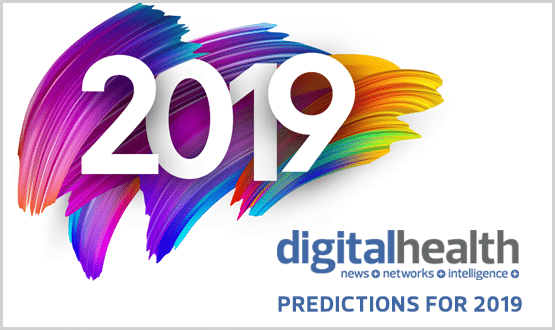2019 predictions: UK digital health leaders on what lies ahead
- 2 January 2019

As we welcome a new year, it is custom to look ahead to what the key themes will be in 2019 in the world of health technology.
We asked a number of leading figures from the sector to give their thoughts on what they think will be big this year.
Will Smart, national CIO for Health and Care
“I predict England will have its first HIMSS7 Acute Hospitals, demonstrating that NHS secondary care organisations can deliver high quality technology and we’ll continue to make progress with Local Health and Care Record Exemplars.
“Informatics will have an increasingly important voice at board level rights across the NHS, as technology is recognised as a key tool to deliver real transformation across all parts of the system, delivering real benefits to patients.”
Simon Eccles, national CCIO for Health and Care
“I believe we’ll see a renewed vigour in digital health technology and I hope an end to the acceptance of ‘not-good-enough’ tech in the NHS, with NHS Boards across the country taking action to support their staff with good technology.
“2019 will see the launch of the first NHS Interoperability Standards, with clear timescales for their adoption, and we’ll see the NHS App being taken up which will start to show us the true potential of the empowered consumer in health.”
Professor Maureen Baker, chair of the Professional Record Standards Body (PRSB)
“Implementing PRSB’s suites of transfer of care and integrated care standards will be a key priority in 2019, supporting the Secretary of State’s vision for digital, data and technology and NHS England’s long-term plan for health and social care.
“Activating clinical leadership is critical to success, and the PRSB is working closely with the Academy of Medical Royal Colleges and its members to drive this forward. People who use services can create a strong pull for adopting standards which could be equally powerful in 2019.
“That’s why we have an emerging leadership programme for patients and citizens, putting them at the heart of standards development. Also local health and care records will be early adopters, demonstrating the benefits and addressing the challenges of creating standardised shared care records.”
Ewan Davis, chief executive of inidus
“Progress with interoperability will slow as vested interests and the sheer difficulty of making it work swamp efforts to get beyond the first few use cases and there will be growing recognition that we need a different approach to create the data fluidly we need.
“As the SEC tighten up on ICOs the blockchain in health bubble will burst and we can get on with exploring what blockchains can really do for digital healthcare.
“Attempts to progress with big data will continue to founder on the rocks of privacy and confidentiality until we realise ‘data is there for the asking, not the taking’ and that the only basis for data sharing should be informed consent.
“The AI community will discover just how poor the quality of medical records is and all the work they will need to do to improve data quality and ensure incomplete and poor quality data doesn’t lead to erroneous conclusions.”
You can hear more, not just from our contributors but other leading health technology figures, at Digital Health Rewired on March 25-26.
The event, taking place at London Olympia, is a two-day conference and one-day exhibition which connects health IT leaders and professionals with the latest disruptive digital health innovations.
Make sure you have booked your place today.





23 Comments
Oh dear, oh dear. What hope is there for any progress, when, on one side the great and the good float motherhood statements about how wonderful the future is going to be, and on the other, Euan and the other grassroots commenters say that the whole enterprise will founder on poor data-quality, vested interests, who stop progress, and the old chestnut of consent.
Apparently the whole thing is going down the wrong track and should be rethought. Oh, give me a break, I have heard that being said over and over again since 2002. You lot should have sorted out those problems by about 2005, so that you could have been able to complete some real systems by , say, 2010. Instead you are still faffing about.
Why don’t you think of the poor patients, who have been crying out for seamless systems which connect GPs, hospitals, and other NHS services.
Take me,for instance. In 2002, I was in my early 70s and confident that I would see good communicating systems, before I popped my clogs. I am now in my late 80s, and have lost hope.
The NHS does not even do email for patients. Over Christmas, a snail-mail appointment letter to me got lost in the post. I was accused of missing the appointment, which was kinda important, a it was under the “two week rule”! Perhaps you NHS IT gurus should sort out basic things like email, before trying out anything more fancy.
Absolutely right Duncan patients could really help with data quality.
What we need is a move away from organisational records to patient centred records. Where the patient decides where their records and held, who has access to them and what they are used for.
There are some challenges, but we set out a vision fir this here https://apperta.org/coPHR
Would it be useful to look at the various different factors involved in really useful electronic patient records which can be used by patients and those concerned with their care?
It might help in understanding the real difficulties involved – & the pessimism of the grass-roots when there is another political/technical announcement that niverna is just round the corner: the experiences under NPfIT/CfH (now airbrushed) might explain our reservations.
1. GP records (maintained for care of individual patients in individual practices, transferred – with possible degradation – when a practice changes system &/or when a patient changes practices) are of unknown & variable quality. One thing *is* certain – they can be hard for those not used to the concepts to navigate.
2. Despite massive amounts spent on secondary care IT – including medical records – very few Trusts keep electronic patient records in a form structurally similar to GP records . I am not clear whether it would be possible for them to do so, but at present it appears (from a position of lack of knowledge of both available systems *&* needs of different specialities within secondary care) not to be imminent.
Add the investment in time & effort needed (speaking as retired GP) I can’t see Coded data entry during consultation happening any time soon.
3. There does not appear to be any consensus on the purpose(s) for EPRs (the records,not the systems), what should be recorded, who should curate them (without putting both patients & other HPCs at risk), how they could be presented (especially in summaries/problem lists) so that vital information is not buried or overlooked or who, in a SSEPR (Single Shared Electronic Patient Record) is responsible for action/inaction on patient care. (In multi-morbidity , optimal management of one condition may potentially be incompatible with management of another).
4. Patients already are entitled to access to their GP records (which leads to another problem regarding protection of 3rd parties) & see http://www.htmc.co.uk/ for a shining example : it also shows how GP records can be displayed in a way that is useful for patients (& others): but medical records are notes kept by HCPs in order to help them manage care of the patient: patient input (& correction) can be very useful: total control by the patient could be risky unless properly managed.
I’m open to conviction.
This is all before considering GDPR, consent for data sharing, opt-outs & managing the NHS – let alone Research, AI & Deep Learning!
Ewan, this patient, and I suspect most others , would want their patient record (or Personal Health Record, if you prefer to call it by that name}, to be held by my GP. It should be a sort of “master record”, with hooks to records held by other bodies, like hospitals.
Hospital records should be subordinate to GP-held PHRs, and called something different, like Hospital Treatment Records. They must be accessible to the GP master record. I am shocked – but not surprised – that Mary Hawking has found that “very few Trusts keep electronic patient records in a form structurally similar to GP records”. This shows how many trusts still suffer from the deeply damaging “IT stops at the hospital gate” syndrome. For patient records to function properly across the NHS, the GPs must be the leaders, and be able to ensure that their local hospitals provide seamless interfaces – and get paid for the effort.
Ewan’s apperta/coPHR architecture will fill the bill nicely. Ewan, have you sold apperta to the great and the good?
This all goes back to how systems were designed in the first place. Almost all systems have been designed around the unit of payment. In UK hospitals this is activity, such as consultant episodes, but in GP surgeries it is largely the patient (capitation). One of the reasons why NPfIT failed was because the US systems they originally chose were built around specific activity, such as procedures, not Finished Consultant Episodes, which are unique to the NHS. Ironically, Larry Weed, who developed POMR, which is used in UK GP systems, was a hospitalist.
I agree with what you say Tim. But it’s also important to understand that records structured like a GP record won’t meet the *clinical* needs of many specialities – Would work well for some but not others.
GP records are terse and lent themselves well to relatively simple coding. In some Specialities there is lost of complex data and/or subtle narrative which does not lend itself to the structure of a GP record
Richard, we need to get the Great and the Good to listen to those with real experience in the trenches of NHS IT.
The problem is a lack of respect – I find it hard not to see the latest bright young things as a naive fools and they think I’m a old fart.
I have the benefit of knowing I’m an old fart and that they are probably right to ignore 80% of what I say – They sadly don’t know what they don’t know and worse probably don’t want to know and risk seeing their easy answers evaporating.
We really need to get a meaningful discourse going. I’m trying but am not optimistic
“We really need to get a meaningful discourse going. I’m trying but am not optimistic”
Ewan,you are right not to be optimistic. I tried for seven years (2009-2016) in the guise of “Dick Vinegar, the Patient from Hell” in the Guardian Healthcare Network. and nobody paid attention. Not only was I an old fart, but a PATIENT as well. So I got even less respect than you, Ewan.
“They sadly don’t know what they don’t know and worse probably don’t want to know and risk seeing their easy answers evaporating.”
This x 1000
Hello Ewan! I have a fantastic idea for driving up the quality of patient data – let patients see it, understand the importance, and correct it! Oh and that should help with the informed consent thing too. But it means trampling on so many professional toes, do you think it will ever happen?
Absolutely right Duncan patients could really help with data quality.
What we need is a move away from organisational records to patient centred records. Where the patient decides where their records and held, who has access to them and what they are used for.
There are some challenges, but we set out a vision fir this here https://apperta.org/coPHR
How come Ewan isn’t in the New Years honours list? Devastatingly honest as ever. Arise, Sir Ewan.
It’s because I stole your quote ‘data is there for the asking, not the taking’ without attribution – We can’t have cads as Knights of the Realm – Can we ….?
Hi Duncan,
As one of the co-authors of this CoPHR https://apperta.org/coPHR paper, I would be very interested in your thoughts, as a patient access advocate. The basic premise is that patients can and should play a full part in records management and access but as part of the professional team, and playing by the same rules of authorship rights and responsibilities. We hope it goes some way to teasing out genuine professional concerns about the risks of unfettered patient contributions from the unjustified protectionist tendencies.
Thanks Ian, it is good work in my view. I am not officially a patient access advocate in any sense other than that it is my strong view as a parent of a frequent flyer and a patient that it makes sense! It is also seems fair. I think the balance you have looks right.
Thanks, Ewan, for highlighting data quality in electronic medical records – which are almost entirely GP records – as well as the privacy constraints.
Why won’t people accept that GPs have been keeping their records – whether on paper or electronically – in order to manage care of their patients & the business of their practices, and *not* to provide “data” for consumption (or sale) by the NHS or others?
Even if GPs could be persuaded to change their record keeping – and Coding – practices to feed the NHS Digital data requirements/demands (good luck with that!) there would still be a problem with historical records (often very significant) either on paper or entered differently in electronic records: total lack of guidance in the past on Coding (or data entry in EPRs) just adds to the problems!
GIGO..
There is a major problem here. As we know from our work together few understand the data quality issue in the way that those in the primary care community who have been working with this data for 30 years do.
What’s recorded and how it coded depends on the purpose and the context of its recording. Data quality is often inadequate for its intended purposes let alone some purpose unknown to its author. Van der Lei’s law “Data should not be used other than for the purpose for which it was collected” is perhaps a bit extreme, but we should keep it in mind. We also know from the work of Professor Simon de Lusignan that the IT system used has a very significant impact on data quality and in particular the extent to which data is coded.
My concern is that a new generation of generic data scientist will fail to understand the nature and complexity of the challenge and reach erroneous and maybe dangerous conclusions. There is the expertise that needed in organisations like QResearch, PRIMIS, PHCSG, THIN and CPRD but they are not being listened to as those looking for magic bullets don’t want to hear how hard it is.
and I was getting all pessimistic about 2019 until I read Ewan’s assessment!
There is a major problem here. As we know from our work together few understand the data quality issue in the way that those in the primary care community who have been working with this data for 30 years do.
What’s recorded and how it coded depends on the purpose and the context of its recording. Data quality is often inadequate for its intended purposes let alone some purpose unknown to its author. Van der Lei’s law “Data should not be used other than for the purpose for which it was collected” is perhaps a bit extreme, but we should keep it in mind. We also know from the work of Professor Simon de Lusignan that the IT system used has a very significant impact on data quality and in particular the extent to which data is coded.
My concern is that a new generation of generic data scientist will fail to understand the nature and complexity of the challenge and reach erroneous and maybe dangerous conclusions. There is the expertise that needed in organisations like QResearch, PRIMIS, PHCSG, THIN and CPRD but they are not being listened to as those looking for magic bullets don’t want to hear how hard it is.
Ewan Davis, insightful and honest. Thank you.
The rest is just puffery and grandstanding.
The nhs app will turn out to be a damp squib because it cannot do anything more than say “go to the Emergency Department” without being a class 2 medical device.
My prediction : It will end up driving more people to the ED!
I agree, and there is an argument for a national consent register in the same way as a postal preference service to address use of data. However the unstructured data issue is something that AI bots could help with in order to leverage the benefit of years of data collection albeit in an ad-hoc format.
Hi Dave,
but only if we have sensible structured data targets for the bots to work to.
Ian
I agree. Logically consent management is quite separate from health apps and identity management, and should be patient-controlled. Just because all apps need some form of access control, does not mean that they should deal with consent management too. Creating a national consent register would be low-hanging fruit.
Comments are closed.